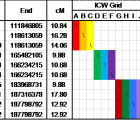
The purpose of this autosomal DNA research study is to investigate whether the shared autosomal DNA that is reported for members of an endogamous population is inherently different from that of a heterogeneous population, and if so, to identify and characterize the qualitative and quantitative differences. As part of this study, we identify, describe, and quantify observed differences in autosomal DNA test results for Jewish, non-Jewish, and interfaith populations, and investigate the possible explanations for these observed differences.
This study analyzes data from Family Tree DNA’s (FTDNA’s) Family Finder test for 100 study participants, divided into Jewish, non-Jewish, and interfaith study groups. It examines how reported autosomal DNA test values, such as the size and number of shared DNA segments, the number of genetic matches, and the distribution of predicted relationships, varies between study groups. The study also investigates how shared autosomal DNA, and longest block values vary by strength-of-relationship for each study group.
The results of this investigation shed light on the differences in autosomal DNA characteristics for Jewish and non-Jewish populations. The authors suggest several refinements to FTDNA’s Family Finder test algorithm and reporting methods to increase their specificity, precision, and relevance for highly endogamous populations such as the Ashkenazi Jewish population.